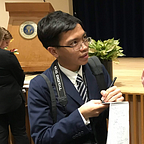Fieldwork: Filipino Migrant Workers in Jordan Vote in the 2022 Presidential Elections
In the course of my fieldwork documenting the stories and experiences of Filipino migrant workers in Jordan, there is collective attention given to the political affairs back in the Philippines.
“It’s true I can neither love my country nor be happy here, but I can suffer and die in it, and for it. That always counts for something. Let my country’s misfortunes be mine, and though a noble thought cannot unite us, though our hearts do not beat with the same name, at least my comrades are united by a common misery, at least I cry at their pain, and the same misfortune oppresses all our hearts.” (399)
These are the words from Dr. José Rizal’s novel “Noli Me Tangere.” This is the Filipino character Elías talking to the disillusioned mestizo Ibarra, page 399 on my Penguin Classics edition of the book. Published in 1887, Rizal’s novel along with its sequel “El Filibusterismo” are literary masterpieces that have galvanized a nation into revolution. The Philippines is the first country in Asia to have a democracy (per its constitution). Rizal’s Noli Me Tangere is one of the first anti-colonial works of art in Asia.
The Philippines now has newly elected leaders and government officials after the 2022 General Elections on May 9. Here in Jordan, I was able to witness and be present with the Filipino migrant worker community in the midst of a consequential election. Jordan is a nation that benefits from the labour of 40,000+ Filipino migrant workers, 95% of whom are women and in domestic work.
From all various political leanings, OFWs (Overseas Filipino Workers, the term used to refer to Filipino migrant workers) I have spoken with in the course of my thesis fieldwork here have told me that 2022 is an election that they feel obligated to participate in. Away from their country and separated physically from loved ones, OFWs in Jordan maintain their connection and care for Mother Filipinas.
Overseas voting in the 2022 Elections started on April 10 where the Philippine Embassy in Jordan was open all day as a polling place for OFWs until May 9. For the Embassy, this is the first automated election where VCMs (voting counting machines) are used to tally the votes. In the past overseas elections, votes are counted by hand. But this year, results are tabulated by computers.
The ramifications of this election is not only relevant in the Philippines but to the rest of the world especially when we talk about democracy, freedom of the press, the impact of social media, and postcolonialism. President-Elect Bongbong Marcos aspires to fulfill the legacy of his father, Ferdinand E. Marcos, who ruled as a brutal dictator from 1965 to 1986. In the context of my thesis and work on labour migration, the American-backed Marcos Dictatorship transformed the Philippines to become one of the largest migrant worker sending countries in the world.
More than 10 million Filipinxs are abroad, and about 10% of the GDP is remittances sent by OFWs and Filipino expats all over. The “Labour Export Policy” of Bongbong Marcos’ father has not only impacted the Philippine economy but even the way of life for Filipinxs, our culture, and how our families look. Many children in the Philippines have grown up without the physical company of their parents, and for most, it’s the mother who becomes the migrant worker working in the position of a domestic worker or caregiver in places like here in Jordan.
I have observed and noted how contentious this election has been. In the Philippines, it is certainly contentious, but it extends all the way to migrant worker communities like here in the Hashemite Kingdom of Jordan.
With this election, I look back to the works of Rizal. I think we need to remind ourselves of our past and the struggles of the generations before us. If we do so, then things like historical revisionism and disinformation will not prevail. After all, there is, as Rizal’s character Elías said, a “common misery” and “the same misfortune that oppresses all our hearts.”
For OFWs, the life of working abroad and being separated from loved ones is certainly one of those challenges that they face regardless of which candidates they voted for. Recognizing this hopefully can bring people together.
